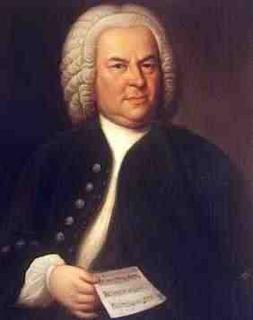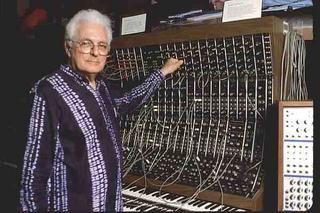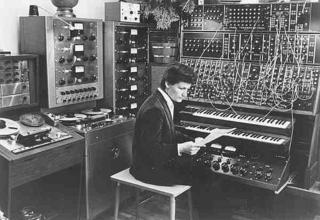
Back to Bach. How can one even attempt to explain him? There are so many aspects of greatness in him that it’s hard to know where to begin. Like the absolute perfection of Abraham Lincoln’s prose, there is a sense in Bach of leanness, of purpose and of discipline all focused to the service of really profoundly beautiful aesthetic sense.
Bach is eminently worthy of whole blogs devoted to himself, but today he’s really only my doorman, my oblique entry point into the world of Bob Moog and the explosive arrival on the musical scene in the late ‘60s of easily-manipulated electronic sound production.

These were heady days, with the birth of the synthesizer giving rise to a whole vocabulary of editing and production techniques and skills adapted to this new sonic world. There were rock artists--Rick Wakeman, or Keith Emerson of Emerson, Lake & Palmer--who brought these sounds into their acts. And that is not strange or any kind of a stretch. Rock and Roll kind of by definition was about blazing new trails. But I’m a classical guy, and this brings me to the crux of today’s subject.

It’s considered old hat now--passe, even--but I return again and again to the work of Wendy Carlos, whose Switched-On Bach album in 1968 was a revelation and sold a zillion copies. My wife despises the bloops and bleeps, but I’m absolutely taken with the vibrancy of it, with the elan and cheek of harnessing these new and unruly timbres and bending them to serve the great polyphonic writing of a composer over 200 years dead.
It’s another testament to Bach’s greatness (as so many have observed before me) that his genius shines thru regardless of the medium: Bach is still spectacularly Bach in arrangements and transcriptions, even the off-the-wall ones. I’ve heard organ and keyboard works played on marimba, orchestral works transcribed for piano, harpsichord works transcribed by string orchestra, choral works played by a steel drum band, everything in Bach’s catalog transcribed for his favorite instrument, the organ; and now we found all of the above transcribed for the monophonic Moog synthesizer.
Producing a complex recording with the Moog was an arduous process. I said before that the Moog enabled "easily manipulated" electronic sound production, and compared to what preceded it it was. Still, the instrument required hours to painstakingly fashion a collection of individual sounds, often rather stumbling in the dark, and there were no means to record the settings of a zillion patch cords and a mess of parameter knobs (short of pen & paper). God help you if you stumbled upon a sound you liked and didn't save the settings: you'd likely never find it again.
And all this to be only able to play one note at a time. I think not everyone grasped that at the time (or even today): a Moog synthesizer cannot play chords. The chords you do hear are several passes on the tape, with each note played individually. So the production of, say, Bach’s Third Brandenburg Concerto took an unbelievable amount of very painstaking work in several distinct phases to get the exotic-sounding 14 and a half minutes that made it onto the recording.

But what a sound! A trained musician can look at a printed score and feel the power of the music, but for the rest of us the proof is in the pudding. And even the printed score won’t give you THIS sonic world! There’s something in Carlos's alien soundscape that absolutely transports me. Some of the lure of the final product is Bach, sure--there’s always Bach; but I think the basic timbres of an analog synthesizer are part of it, too. Isao Tomita was working with the same instrument about the same time, producing very different-sounding renditions of Debussy. I love these as well (and it doesn’t hurt that Debussy was another almost unfathomable genius).
Now so many of these tools are available for one’s computer, that one can do quite simply what Carlos took years to develop. Indeed, she helped define the playing field. But today I raise a glass to Bob Moog. He helped put a whole new wing onto the Hall of Music, and it’s one of my favorite wings.
9 comments:
I will raise my glass too! I keep a recording of Carlos' Sinfonia to Cantana 29 on cd in my truck and it wakes me up when I drive to work. Nothing like blasting that through my truck speakers at high volume at 7:30am!
I've received more than my share of strange looks from people astounded and dismayed by what blasts from my car at stop lights!
I'd have loved to be a fly on the wall for those first experiments with Moog and tape where baby steps became music. I think of this all the time!
That Sinfonia now sounds so early & crude!
Not big on that sound, but I still enjoy music. Especially arranged music. It seems to me that the more we stumble into the future, the less we keep in touch with our musical roots. A good example? Nickleback. Ughh, enough said.
Alltime greatest arranged song for me? Appalachian Spring, Aaron Copland.
Joshua
Copeland had something, to me, like Vaughan Williams (one of my top three or four composers)--a kind of intrinsic "American-ness" to his writing. I think the Fanfare for the Common Man is a fantastic little three minutes of music. I also love a chamber piece of his called "Quiet City." Very good stuff.
That's exactly how I described him to my fiancee. listening to Copland is like eating apple pie. It is Americana.
Joshua
Goodness of soul. My dad has that on tape and he'll sometimes haul out the tape deck and listen to it while puttering in the shop. I love to sit and listen to the sounds. It's older...but age and music are like oil and zebras. There is nothing that really impacts the other. old school is just as good as the crap that plays today....note I said crap...
I guess that's the point of it all: greatness is timeless, and trends and fads come and go unless they change the course of the river in which we live. We listen to Bach today because he not only was a genius, he even helped to determine the course of Western tonal music. Maybe Bob Moog grabbed a little part of that eternity.
It's worth mentioning that Wendy Carlos & Isao Tomita, and these classical expeditions, did not receive a single word of mention on a recent documentary DVD I bought of Bob Moog. Maybe there's a reason Wendy was not interviewed, but I'd have loved to see one.
Good call on Appalachian Spring, Joshua. One of my all time favorites. Not sure if you've been to Glacier National Park in Montana, but I went there last year. Drove up the continental divide at sunrise with Appalachian Spring on...it was truly an amazing experience. Copland + American landscape = Perfection.
Post a Comment